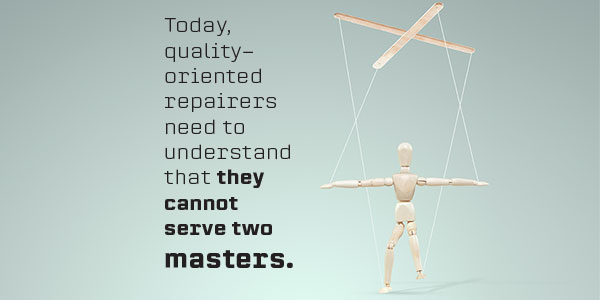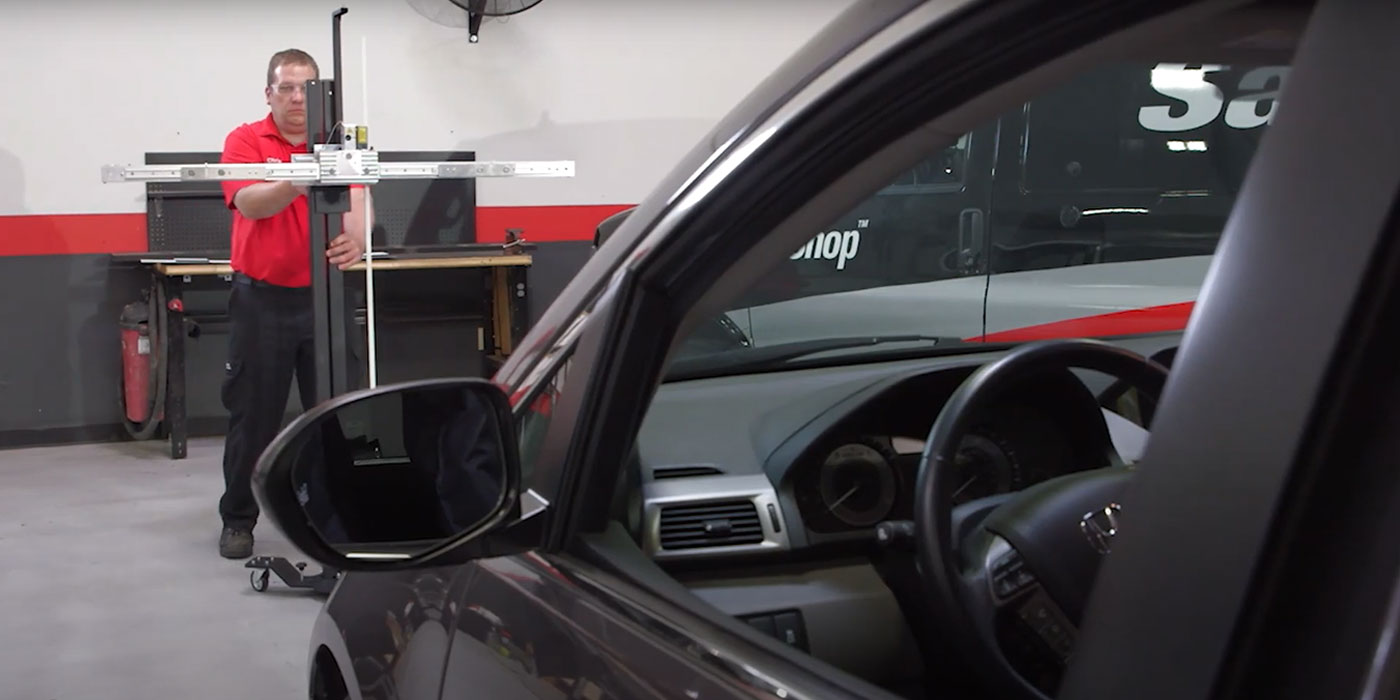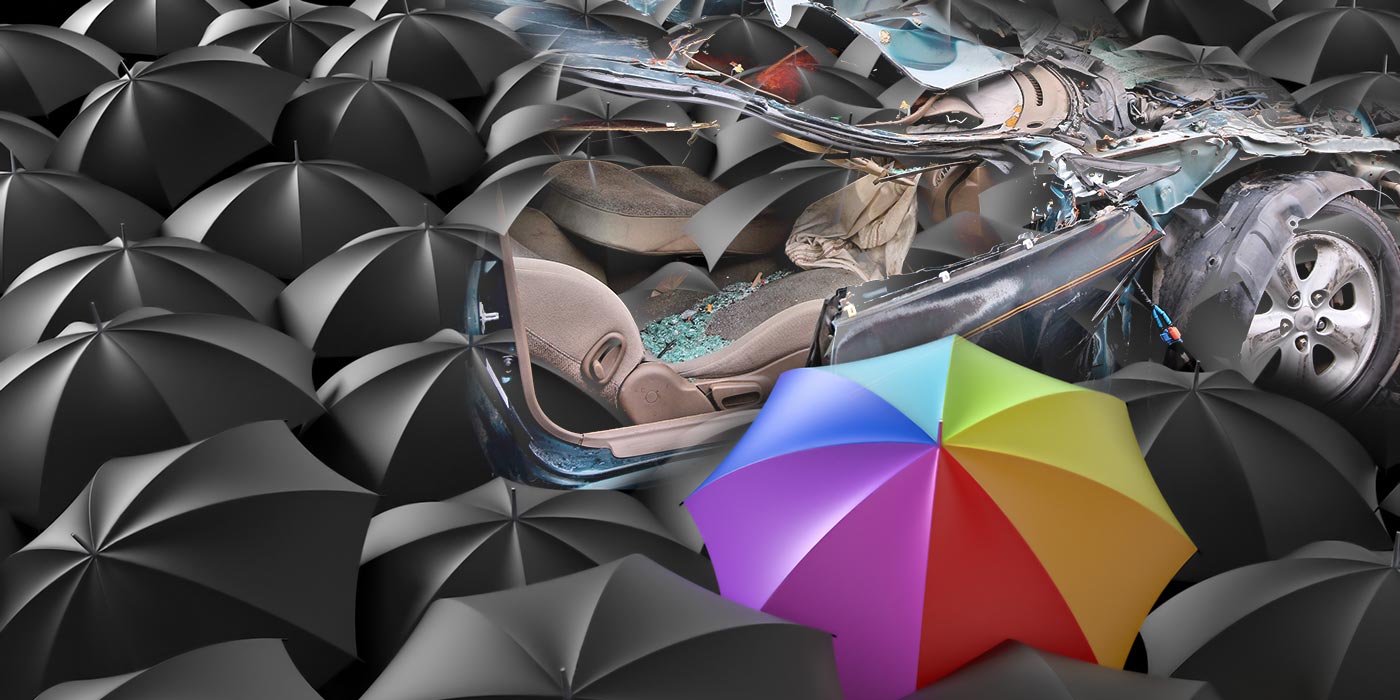Claims people are constantly trying to mitigate and reduce claims expenses … and, when feasible, they should. After all, we all pay insurance and want premiums to be kept as low as possible. Higher claims costs result in higher premiums and, as far as I’m concerned, they’re already too high. However, containing claims costs at the expense of others just ain’t right! One prime example of a bad situation that has gotten worse is total loss settlement practices.
Lowball Estimate
The consumer has a collision, and the insurer inspects the vehicle and writes a lowball estimate in the hopes that:
- The vehicle owner takes the settlement and doesn’t get the vehicle repaired, or
- The vehicle owner goes to a low-quality repairer who will try to repair it for the insurer’s lowball estimate (rather than lose the job due to it being totaled)
However, when the vehicle owner wants the vehicle repaired and then goes to a quality-conscious repairer that prepares their own assessment, the insurer is faced with the option to either provide for a quality repair or deem the vehicle a total loss. Of course, the most economical choice is the one that is often taken … and, in most instances, it abides by state laws and regulations regarding economic thresholds that determine whether a vehicle must be deemed a total loss.
Once determined to be a total loss, some insurers attempt to have the vehicle removed from the repairer to stop storage charges and sent to a storage-free holding area, such as a salvage yard or auto auction facility. This, of course, is prudent and I support it … but wait. What about making a total loss settlement offer to the vehicle owner for the replacement of the vehicle? Shouldn’t that take place first?
The conversation between the claims rep and vehicle owner often goes something like this:
“Mr./Ms. vehicle owner, after reviewing your damages and the cost to repair, we have determined your vehicle to be a total loss, and we need to have you release the vehicle from the shop so we can move it for safekeeping and stop the ongoing storage charges. Once you do, please call me so I can arrange a service to pick it up and move it. This will help you avoid paying for further storage charges out of pocket. And, by the way, we’ll need you to sign over your vehicle’s title so we can initiate the required paperwork and steps for settlement. Once we get the vehicle moved and secure the title, we’ll evaluate the vehicle’s value and be able to make you an offer for the pre-loss replacement value of your vehicle.”
At this point, a wary consumer should be thinking, “Wait a minute … if someone came to me and said, ‘Hey, I’d like to buy your car, would you consider selling it to me?’ and I say, ‘Well, yeah, I would consider selling it,’ and the buyer then states, ‘Great, give me the keys and sign over your title and I’m going to take it…and in a week or two, I’ll let you know how much I’m willing to pay you for your car’” … Who in their right mind would agree to such an idea?
Well, it happens far more often than you would think, simply because consumers believe insurers have to do things properly or they’ll get into trouble. After all, someone has to be overseeing insurers making sure they do things properly … right?
Trusting the Insurer
Let’s continue on. So, like a good neighbor, the customer trusts the insurer and authorizes the release of the vehicle from the body shop to stop storage charges. After all, what could possibly go wrong?
The insurer then pays the shop for its billing for services rendered (tow payout, labor, storage, gate fee, administrative activities, retrieval of customer’s license plate(s) and personal belongings, etc.) and has the vehicle picked up and relocated to a storage-free facility for “safekeeping” (where the car may be moved around the yard with a forklift!).
Sometime later, the insurer provides the consumer with an offer for the pre-loss replacement value of the vehicle, which is considerably lower than the vehicle owner had anticipated. The vehicle owner raises concerns, and the insurer sends over a multi-page valuation report supporting the offer with quotes and comparables. The insurer then advises the customer that they have until the next day to accept the settlement offer or else lose the rental car. This leaves the vehicle owner no time to check out the comparables provided in the insurer’s valuation to see if they exist, have been sold or if they’re even similar to their own vehicle — let alone the time to shop around for a replacement.
The vehicle owner, who feels there’s no choice, as one needs to purchase a vehicle to get one’s life back in order (get to and from work, get the kids to and from school, get groceries, etc.), begrudgingly accepts the insurer’s lowball settlement and then begs to keep the rental car for a few more days to secure a replacement vehicle.
The insurer reluctantly allows that person three more days of rental and then issues the “full and final settlement” payment to the vehicle owner. The only problem is that the vehicle owner finds the amount far less than they had agreed to accept and is told that the insurer has deducted the amount that was paid to the body shop for charges the insurer didn’t believe it should pay for. Now, the consumer is left with less settlement and has only a couple days of rental. When complaining to the insurer, the insurer responds with:
“Unfortunately for you, your chosen body shop overcharged you for its services. No other shops charge for these types of charges or charge such high rates. We only owe for what is reasonable and customary in the market area. This shop is known for overcharging, and if you had asked us early on, we could have referred a dozen shops who wouldn’t charge you for such charges. You need to go see your shop to try and get your money back.”
I know that some of you reading this have likely had a similar experience, and some probably ended up feeling bad and paid their customer “to make it right.” Those who did more or less admitted to overcharging and trying to take unfair advantage of the insurer … and that is the belief the customer will ultimately walk away with. And, the shop will not only never see this customer again but it’ll likely never see anyone this customer knows.
Uneducated Consumers
Why are insurers often successful in such activities that harm consumers and repairers? Because consumers are not being made aware of such issues and concerns or educated on how to protect themselves. Who other than collision repairers knows what is going on, and who is in a better position to help them? The insurers surely won’t help, their insurance agents won’t help, most consumers will not seek legal counsel, and quite frankly, most attorneys are unaware of such activities and therefore are of little help. Also, they often provide poor advice in such matters.
Today, quality-oriented repairers need to understand that they cannot serve two masters. They will either fully serve their community members and neighbors, or they will serve the insurance industry and their efforts to profit at the loss of others.
Quality-oriented repairers need to learn how to educate their customers in their times of need so they can know the facts and be in a position to protect themselves and their family’s personal safety and economic well-being through receiving proper repairs with proper procedures, parts and materials as well as restoring their vehicles to their pre-loss condition to the very best of reasonable human ability.
Insurers are banking (literally) on the fact that many repairers don’t wish to expose the ugly side of the collision repair industry to their customers. After all, customers come to a body shop to fix their problems, not cause more, right? Yes, they come to the repairer to put their lives back together and do it properly and thoroughly … and believe it or not, they expect the expert repairer to protect them just as they expect the best from their doctor, surgeon, dentist, pharmacist, banker, accountant, attorney and other professionals who have a profound fiduciary responsibility to their patients and clients. To do less and not help them in their times of need is simply unacceptable.
Your community members deserve your very best, and if you are not being totally honest and transparent with them regarding the repair of their vehicles and sharing your knowledge regarding the less-than-ethical practices of some insurers, you’re failing them and you’re failing your profession and the collision repair industry at large.
Consider if every quality-oriented collision repairer in the country started to expose to their customers when insurers fail to act in their best interests. Can you imagine how fast positive change would come and how quickly the industry would change for the better?
You don’t have to wait for the industry to make change across the nation. You can effect change in your community today and truly become “the only one” for very good reason and enjoy extremely positive results.
I have dozens of body shops that I’ve coached and consulted over the years that have learned to do the right things, in the right way, for the right reasons. They’re extremely busy from referrals of satisfied customers and are making profits they never dreamed possible. Most of all, they have their pride restored and are truly loving what they do and how they’re doing it. And this is all being done without incurring unnecessary liabilities.
If you want proof of this, I encourage you to click here and read what others are saying about the help they received and how it helped them regain the joy of being in the business of collision repair.
Remember, if you’re not having fun doing what you’re doing, you’re likely doing something wrong!
















